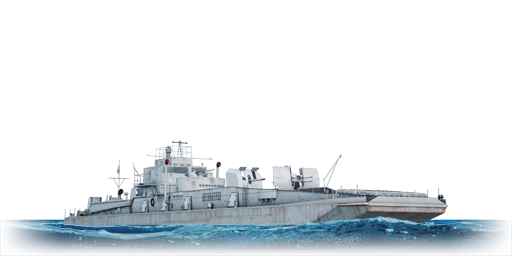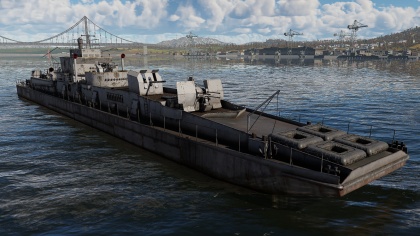Difference between revisions of "AF D1"
(Edits.) |
(→Armament: links) |
||
| Line 18: | Line 18: | ||
== Armament == | == Armament == | ||
=== Primary armament === | === Primary armament === | ||
| − | ''Provide information about the characteristics of the primary armament. Evaluate their efficacy in battle based on their reload speed, ballistics and the capacity of their shells | + | {{main|8,8 cm S.K.C/35 (88 mm)}} |
| + | ''Provide information about the characteristics of the primary armament. Evaluate their efficacy in battle based on their reload speed, ballistics and the capacity of their shells.'' | ||
Broadly describe the ammunition available for the primary armament, and provide recommendations on how to use it and which ammunition to choose. | Broadly describe the ammunition available for the primary armament, and provide recommendations on how to use it and which ammunition to choose. | ||
=== Secondary armament === | === Secondary armament === | ||
| + | {{main|2 cm/65 Flakvierling 38 (20 mm)|MG M38(t) (15 mm)}} | ||
''Some ships are fitted with weapons of various calibers. Secondary armament is defined by the weapon chosen with the control <code>Select secondary weapon</code>. Evaluate the secondary armament and give advice on how to use them. Describe the ammunition available for the secondary armament. Provide recommendations on how to use them and which ammunition to choose. Remember that anti-air armament, even heavy caliber weapons, belong in the next section.'' | ''Some ships are fitted with weapons of various calibers. Secondary armament is defined by the weapon chosen with the control <code>Select secondary weapon</code>. Evaluate the secondary armament and give advice on how to use them. Describe the ammunition available for the secondary armament. Provide recommendations on how to use them and which ammunition to choose. Remember that anti-air armament, even heavy caliber weapons, belong in the next section.'' | ||
| − | |||
| − | |||
=== Anti-aircraft armament === | === Anti-aircraft armament === | ||
| + | {{main|3,7 cm SK C/30 (37 mm)}} | ||
''An important part of the ship’s armament responsible for air raid defense. Anti-aircraft armament is defined by the weapon chosen with the control <code>Select anti-aircraft weapons</code>. Talk about the ship’s anti-air cannons and machine guns, the number of guns and their positions, their effective range, and about their overall effectiveness – including against surface targets.'' | ''An important part of the ship’s armament responsible for air raid defense. Anti-aircraft armament is defined by the weapon chosen with the control <code>Select anti-aircraft weapons</code>. Talk about the ship’s anti-air cannons and machine guns, the number of guns and their positions, their effective range, and about their overall effectiveness – including against surface targets.'' | ||
| − | |||
| − | |||
=== Special armament === | === Special armament === | ||
| + | {{main|WBD depth charge}} | ||
''Depth charges, mines, rocket launchers and missiles are also effective in skilled hands and can be an unexpected surprise for an opponent. Evaluate the ammunition of this type of armament and rate its performance in combat.'' | ''Depth charges, mines, rocket launchers and missiles are also effective in skilled hands and can be an unexpected surprise for an opponent. Evaluate the ammunition of this type of armament and rate its performance in combat.'' | ||
Revision as of 08:04, 28 January 2020
Contents
Description
The D1-class, AF D1 (abbreviated as AF D1) is a Rank IV German naval ferry barge
with a battle rating of 2.7 (AB/RB/SB). It was introduced in Update 1.79 "Project X" in the fleet closed beta test.
General info
Survivability and armour
Talk about the vehicle’s armor. Note the most well-defended and most vulnerable zones, e.g. the ammo magazine. Evaluate the composition of components and assemblies responsible for movement and maneuverability. Evaluate the survivability of the primary and secondary armament separately. Don't forget to mention the size of the crew, which plays an important role in fleet mechanics. Tips for preserving survivability should be saved for the “Use in battle” section.
If necessary, use a graphic template to show the most well-protected or most vulnerable points in the armor.
Mobility
Write about the ship’s mobility. Evaluate its power and maneuverability, rudder rerouting speed, stopping speed at full tilt, with its maximum forward speed and reverse speed.
Armament
Primary armament
Provide information about the characteristics of the primary armament. Evaluate their efficacy in battle based on their reload speed, ballistics and the capacity of their shells.
Broadly describe the ammunition available for the primary armament, and provide recommendations on how to use it and which ammunition to choose.
Secondary armament
Some ships are fitted with weapons of various calibers. Secondary armament is defined by the weapon chosen with the control Select secondary weapon. Evaluate the secondary armament and give advice on how to use them. Describe the ammunition available for the secondary armament. Provide recommendations on how to use them and which ammunition to choose. Remember that anti-air armament, even heavy caliber weapons, belong in the next section.
Anti-aircraft armament
An important part of the ship’s armament responsible for air raid defense. Anti-aircraft armament is defined by the weapon chosen with the control Select anti-aircraft weapons. Talk about the ship’s anti-air cannons and machine guns, the number of guns and their positions, their effective range, and about their overall effectiveness – including against surface targets.
Special armament
Depth charges, mines, rocket launchers and missiles are also effective in skilled hands and can be an unexpected surprise for an opponent. Evaluate the ammunition of this type of armament and rate its performance in combat.
Usage in battles
Describe the technique of using this ship, the characteristics of her use in a team and tips on strategy. Abstain from writing an entire guide – don’t get try to provide a single point of view, but give the reader food for thought. Talk about the most dangerous opponents for this vehicle and provide recommendations on fighting them. If necessary, note the specifics of playing with this vehicle in various modes (AB, RB, SB).
Pros and cons
Pros:
- Very useful array of weapons, having a (relatively) effective weapon system for both larger vessels and smaller ones
- Micromanagement of weapon systems can be extremely effective against multiple enemies
- Plenty of armour for its battle rating
- Large size allows for spread out crew and modules, and thus great survivability
Cons:
- Slow speed makes for long commutes between different points on the map
- Low thrust to weight ratio and heavy weight makes changing speed difficult
- Slow rudder shift time makes manoeuvring and evasion troubling
- Weapons can be easily knocked out
- Long length makes it extremely susceptible to torpedo attacks
History
Describe the history of the creation and combat usage of the ship in more detail than in the introduction. If the historical reference turns out to be too big, take it to a separate article, taking a link to an article about the vehicle and adding a block "/ History" (example: https://wiki.warthunder.com/(Vehicle-name)/History) and add a link to it here using the main template. Be sure to reference text and sources by using <ref>, as well as adding them at the end of the article.
Media
An excellent addition to the article will be video guides, as well as screenshots from the game and photos.
See also
Links to the articles on the War Thunder Wiki that you think will be useful for the reader, for example:
- reference to the series of the ship;
- links to approximate analogues of other nations and research trees.
External links
Paste links to sources and external resources, such as:
- topic on the official game forum;
- encyclopedia page on ship;
- other literature.
| Germany barges | |
|---|---|
| Anti-air ferries | SF40 Light · SF40 Heavy |
| Naval ferry barges | AF D1 · AF D3 |





